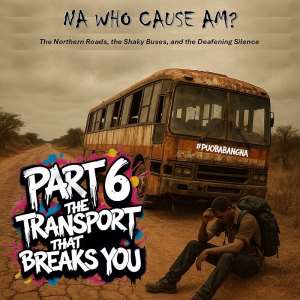
Now let’s talk about the bus itself—
The State Transport Corporation (STC) and its cousins on wheels (counterparts).
When I boarded that bus from Tamale to the Upper West Region, I braced myself.
I knew it wouldn’t be smooth.
What I didn’t know was just how hard the journey would fight my bones.
The seats were exhausted.
The shocks had given up hope.
The air-conditioning whispered promises it couldn’t keep,
And the whole vehicle moaned like a relic forced back into service against its will.
Every pothole—and there were many—felt personal.
It wasn’t a ride.
It was a boxing match, and my spine took most of the punches.
At one point, I glanced around.
Faces told the story:
Strained.
Tired.
Wincing.
No one needed to say a word.
Pain was the common language.
One particularly deep crater launched us into the air—
Babies cried, the elderly groaned, and I silently took inventory of my internal organs.
This isn’t a joke.
It’s not drama.
It’s reality.
One that thousands of Ghanaians endure every single day.
And it forces a painful question:
Why are these buses allowed on such roads in the first place?
STC and similar operators often boast of being safe and dependable.
And yes, compared to some chaotic alternatives, they are better organized.
But safety isn’t just about avoiding crashes.
It’s also about not arriving with your back broken and your spirit crushed.
A bus with no working suspension, no proper ventilation, and questionable mechanical integrity has no business doing embarking on trips that takes hours —especially not on roads that resemble battlegrounds.
What cuts even deeper is the obvious disparity:
The worst buses are sent to the North.
The oldest, most fatigued vehicles seem reserved for these routes,
As if a silent message has been passed down:
“Those people can manage.”
Second-class transport for second-class citizens.
Meanwhile, newer, air-conditioned, smoother buses glide across southern highways.
The insult is layered—bad roads meet bad buses.
The result?
A journey that doesn’t just challenge your body.
It humbles your humanity.
By the time you arrive, it’s not relief you feel.
It’s not joy.
It’s not homecoming.
It’s exhaustion.
And resentment.
And pain.
That should never be the price of returning to your own roots.
So once more, I ask: Na who cause am?
Is it the transport companies that disrespect us with barely-roadworthy vehicles?
The authorities who approve them and look away?
Or is it we the passengers—who ride silently, suffer quietly, and normalize indignity?
Up next: Part Seven: “The Culture of Silence: When Suffering Becomes Normal.”
#Puobabangna
(The Northern Roads, the Shaky Buses, and the Deafening Silence)
By Victor Raul Puobabangna from Eggu, in the Upper West Region of Ghana


